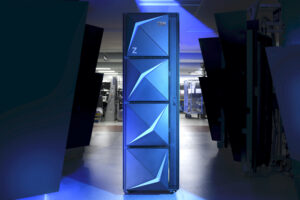By Jason Bloomberg
Some people believe the mainframe is obsolete – an ancient relic of 1960s computing. For others, it serves an important role as long as it sticks to its knitting, handling core transaction processing for banks and other large enterprises.
Take a closer look, however, and you’ll see the mainframe is an active platform for innovation, both by the vendors that develop its software and for mainframe customers that are finding a role for Big Iron in their cloud-native plans for innovation.
Mainframe incumbents make moves
As the sole remaining vendor of mainframe systems, IBM Corp. is largely responsible for the continued growth of its IBM Z mainframe product line (pictured). To open the door to innovation, Big Blue has been rationalizing and lowering mainframe pricing over the last few years, bringing the platform into cost alignment with cloud alternatives. (* Disclosure below.)
Making the platform more palatable, however, is only the tip of the iceberg. In truth, IBM is driving innovation on the mainframe in many areas.
Most notably, IBM has been rolling out IBM Wazi Developer for Red Hat CodeReady Workspaces, a cloud-native development experience for its venerable z/OS mainframe operating system. With Wazi, developers can use their IDE of choice to develop mainframe applications on the Red Hat OpenShift Container platform. “Wazi provides COBOL developers with exactly the same experience as Java or Node.js developers,” said Rosalind Radcliffe, chief architect for DevOps for z Systems at IBM, “both the tools experience and the way you write code.”
Another more surprising area of innovation for IBM on the mainframe: providing security for commercial cryptocurrency wallets.
Crypto private keys and the wallets that ostensibly hold them are notoriously vulnerable, as crypto owners have no recourse should their keys or wallet become compromised. For decentralized finance or DeFi vendors and other companies that do business with crypto, protecting their keys and their wallets is a mission-critical requirement. “You want to provide the accessibility of hot wallets with the security of cold wallets,” explained IBM Distinguished Engineer Rebecca Gott. “Hyperprotected virtual servers protect data in use.”
I also spoke to incumbent mainframe vendor BMC Software Inc., whose 2020 acquisition of mainframe tools vendor Compuware has bolstered its innovation story. Compuware had been focusing on mainstreaming the mainframe by bringing industry-leading DevOps processes and capabilities to the platform.



